- Home
- T. H. White
Darkness at Pemberley Page 2
Darkness at Pemberley Read online
Page 2
The Inspector cast his mental eye round the room as he remembered it. "Was it a gramophone running down?" he enquired.
"Yes!" exclaimed the Master. "That was what it was. The needle on a gramophone disc after it had finished the music!"
"Somebody must have been alive within five or six minutes of that anyway. Could you give me the exact time?"
The Master said: "It must have been about eight o'clock—within a quarter of an hour either way."
"What time did you dine?"
"I dined in the Lodge on Tuesday. I was feeling rather tired. Dinner would be at half past seven."
"It wasn't late, by any chance?"
"No, Anson gives me my meals very punctually. I don't take much at night."
"How long does it take you to dine?"
"Not more than forty minutes. I had some soup, then fish, chicken and then custard. I was alone. My wife was in London for a meeting of the Child Welfare."
"Very well, say you finished dinner at ten past eight. What did you do then?"
"I went into the study for a cigar. When I was lighting it I remembered Beedon's papers, so I took them over."
"Immediately after dinner?"
"Not quite immediately. I opened a new box of cigars. I don't move very quickly nowadays, Inspector."
"Say you left the Lodge at a quarter past eight, then?"
"Yes, that would be about the time. I daresay it was twenty minutes past before I got to Mr. Beedon's rooms. I walk rather slowly."
"So somebody was alive inside as late as fourteen minutes past eight, or thereabouts. Thank you very much, sir. That will help us a great deal."
"I wonder," said the Master as Inspector Buller was going out, "if you would let me have the papers back which are in Mr. Beedon's letter-box: as soon as you've finished with them, of course."
The Inspector came back into the room. He said: "By all means, sir, only we shall have to look at them first as a formality: that is, if you don't object. Nothing private, I hope?"
"Not at all, Inspector; look at them as much as you like. Simply papers relating to a pupil of Mr. Beedon's."
The Inspector hesitated. "Would you take offence, Master, if I asked your permission to look at your glasses?"
The Master gave him a startled look and took them off. "A regular Sherlock Holmes!" he remarked pleasantly, handing them across. The Inspector turned them over absently and passed them back, looking the Master in the eyes. "Thank you very much," he said. Then he wished the Master good morning and walked out into the wintry sunshine.
Back in A4, he addressed the sergeant: "We shall have to see everybody who came up this staircase last night. The Master had some evidence which bears out your theory to this extent, that somebody—presumably Beedon, but it might be his murderer—was alive in this room when we were looking at the dead body over the way. Will you give me that envelope in the letter-box?"
The sergeant fetched it and watched it carefully opened. Inside was a blank sheet of paper.
"This is from the Master," the Inspector said. "He told me that it contained papers relating to a pupil of Beedon's."
"I suppose the old geezer slipped the wrong sheet in by mistake."
"Very likely. Will you go to the Lodge now, give him my compliments, and tell him what we've found. Ask if we could see the actual papers."
The sergeant came back with three or four printed forms, a syllabus of a revised Tripos examination torn from the pages of the University Register.
"Well," said the Inspector. "These might apply to a pupil of his, I suppose. But I see Mr. Beedon took in the Register himself, and who would put a single sheet of paper into an envelope, in mistake for three or four?"
"You might," replied the sergeant. "If you were unconscious enough to make a mistake at all, you might just as well make a big one. These old gents all get rather loopy."
"Yes, I daresay they do," answered the Inspector wistfully, looking at his blunt nails, "what with knowing such a lot. But would they write their names in invisible ink before they enclosed the paper by mistake?"
The sergeant looked suspiciously at the piece of paper which was held out to him. There, in the middle, was a ghostly signature, faint and blue.
"This is the cheap sort of ink which they sell to amuse children in toy shops like Hamley's. You just warm it by the fire. I suppose dons are rather children. They never stop being at school all their lives. First Nanny to protect them in the nursery, then the governess and the head master and finally the Vice-Chancellor. A guinea-pig, now, is independent of its parents after three days."
"Are you getting at anything," asked the sergeant resentfully, "or is this just uplift?"
"I don't know. You never can tell. Children have games and are sometimes naughty. Now would you say this was one of the Master's games, which we've come across by mistake, or would you say he was being naughty?"
"After all, the old man may be senile or something. He may have a passion for playing with invisible ink. It might be a joke. It might still be a mistake. Perhaps he wrote his name on it and forgot, and then put it in by mistake as we said. If you asked him, he would probably explain it quite easily."
"So I won't ask him, sergeant," said the Inspector, with a smile, whose point the sergeant missed. "We'll have to steal a clean sheet of paper from the Lodge when it comes to giving this back. Have the photographers finished?"
"Yes."
"Just have them microphotograph the catch and tone-arm of the gramophone. I suppose they've done the door? Send the search-party's tabulation to my room. I'll be there directly. Oh, and ask the surgeon whether anything else besides narcotics would contract the pupil of the eye?"
At the Porter's Lodge, Buller borrowed a pen and paper. He asked the porter to display his notice on the screens. It read:
"Will any person who attempted to visit Mr. Beedon on Tuesday night after seven o'clock be so kind as to offer his evidence at the police station? The matter is urgent."
Then he went to the nearest call office, and 'phoned the Chief Constable with the request that the matter should be turned over to Scotland Yard.
CHAPTER III
A well-tailored young man in a green hat came down from London, driving an 8-litre Bentley. He was very polite to the Inspector, and agreed absent-mindedly with everything he said. The Inspector laid before him lists of everything found in either of the two rooms, a résumé of the evidence up to date, and the surgeon's report. The young man decided to supplement the latter by calling in Sir Loftus Boneface. He also interviewed Mr. Mauleverer and the undergraduate Weans, who came forward in response to the Inspector's notice. Next day he drove away again, having instructed the Inspector to ask for a verdict of murder and suicide against Mr. Beedon. He apologised for not being able to stay for the inquest, which was fixed for two days later, but promised that Sir Loftus would come down again to give evidence—which would ensure everything going off satisfactorily.
Mr. Beedon, according to his reconstruction, had shot Frazer for reasons unknown (and, considering the strength of the other evidence, unnecessary) at five to eight. He had then returned to his rooms, played a record on the gramophone whilst Mauleverer was shouting at him through the door, and shot himself at about 8.15. The conclusive evidence in favour of this theory was provided by Sir Loftus, who proved that the bullets were fired from the same weapon, which was found in Mr. Beedon's hand bearing no fingerprints but those of Mr. Beedon. It was decided that the Master's invisible signature was a mare's nest, or at least a matter unconnected with the crime under consideration. Sir Loftus pointed out to the Inspector that evidence must be discriminated. A lot of evidence, he explained, would always crop up without relevance, and it was the mark of the great detective to be able to separate the germane from what was not. Among matters set aside by Sir Loftus as irrelevant were: The Master's signature, the photographs of the catch and tone-arm of the gramophone, a set of unidentified fingerprints on the door, and a tiny piece of typewriting-paper ash still clinging to
a piece of coal in the dead fire. The Inspector saw Sir Loftus off by the mid-day train, after thanking him very much indeed for his assistance.
Then he went back to his room in the police station, where he was coldly received by the sergeant, and sent for the police surgeon.
The two men were old friends.
"Well," said Dr. Wilder, "I suppose his highness has cleared everything up?"
"Sir Loftus is very quick on the uptake," said the Inspector defensively.
Dr. Wilder smiled affectionately and offered a cigar, which Buller refused.
After a pause, "Did you agree unconditionally with Sir Loftus's post-mortem?" asked the Inspector.
"I think so."
The Inspector pushed the photograph of the tone-arm across. "Why," he asked, "did Beedon put on that gramophone without leaving any fingerprints on the catch or arm?"
"There must be some sort of mark."
"The arm has been carefully wiped, finishing with a single sweep which leaves an unbroken grain along its whole length. A cloth has been pulled down it from top to bottom to finish off. Underneath, this grain is disturbed by a very slight smudge. The catch has been wiped in the same way, and is also marked underneath (and on the two narrow sides) but this time by a distinct line. This line is about an eighth of an inch thick. The catch was released by means of a piece of string. How the arm was lowered I don't know."
"Very well."
"Why," pursued the Inspector, "did the Master, who is a drug addict, post a letter to Beedon containing a blank sheet of paper with his signature in invisible ink?"
"Actually," said the surgeon, "I knew the old man took cocaine. But how did you?"
"His eyes struck me as curious, so I got him to take his spectacles off and had a good look at him. The pupils were contracted to pinpoints."
"People who take drugs are sometimes very cunning," put in the doctor reflectively.
"I know."
"Did he do it?" asked the surgeon humbly.
"How am I to know? How am I to know anything? That isn't half the evidence."
"Well, go on."
"Who went to the door after Mauleverer, and probably opened it with a key? And why hasn't he come forward?"
"Did somebody?"
"The three latest sets of fingerprints are Weans's with Mauleverer's over them, and then an unknown man's on top of Mauleverer's."
"Anything else?"
"Ten or twelve million things, I suppose, but Sir Loftus tells me you have to discriminate. So, cutting all of them out, there's one more thing which may be on my mind. Who has been busy spring cleaning in A4? Because whoever it is has a queer method of doing things. The keys of the typewriter in the study looking over Copper Street are all printed with Beedon's fingers. But the little wheel thing which you turn to make the roller revolve has been wiped like the gramophone. All waste papers, notes and so on have been torn once across and dropped in the wastepaper basket—just the day's correspondence, you know. And yet one piece of typewriting-paper has been burnt in the fire and carefully powdered. Lastly the automatic. It is as clean as the tone-arm except for a smudge on the barrel and one clearly defined set of fingerprints as transferred by the hand in which we found it. The smudge on the barrel really resolves itself into a second wiping which does not quite correspond with the grain of the first one. But the extraordinary thing is the single sharp definition of Beedon's grip. If you had carried an automatic across the street, shot somebody, put it down to play the gramophone, picked it up and shot yourself, would you have left only one set of prints?"
"He may have wiped it for some reason or another between playing the gramophone and shooting himself."
"Quite likely. I think if I were going to shoot myself I should nurse the gun, and wipe it, and think it over. But even then, when I picked it up for the last time, I should change its position in my hand—to get a grip of it, you know, and that sort of thing. This stock has only been gripped once, and in one position."
"Well," said the surgeon, "now tell me who shot them both?"
"You be damned," replied the Inspector crossly. He went out of the room.
*****
But that afternoon he was still talking to the doctor. There was something excited now, straining under the reserve of his tired face, and something which made him look younger and enthusiastic. He was almost garrulous, and talked on to his friend without paying him much attention. Nor was he attending principally to what he was saying. His attention hurried on in advance of his words, like somebody hastening through a big untidy warehouse matching coloured cloths just beyond the lantern's circle of radiance lighting those who followed him.
"Why! Why! Why!" he exclaimed. "Why did Beedon play the gramophone when Mauleverer was outside the door? If he didn't want to go to the theatre, and wanted Mauleverer to go away, why should he advertise his presence by putting on a record?"
He did not wait for an answer. "Why," he continued, "did Mauleverer take the trouble to go up those stairs with an unbiased witness?"
The doctor felt it was his duty to break in. "Mauleverer went up to see why Beedon wasn't ready for the theatre. He went with Weans because they were on their way to the theatre together. That's natural, isn't it?"
"Quite natural. It gives Mauleverer an absolute alibi, for the gramophone proves that somebody was alive inside the room when Mauleverer was outside it, bound for the theatre. By the way, Mauleverer admits that he was with Beedon at about seven o'clock, so he would have been the last person to see him alive if it wasn't for this gramophone—that's supposing that the man who played it was Beedon's murderer. Mauleverer gets out on the ground floor either way—on Boneface's explanation. Either Beedon was alive and playing the gramophone when Mauleverer started for the theatre between 8.10 and 8.15—in which case he can't have killed him—or else there was somebody else in the room, who had come there since Mauleverer left. The gramophone proves either that Beedon killed himself, or that somebody else did who was in the room while Mauleverer was on his way to the theatre."
The Inspector puffed fiercely at his pipe until it sparked. "Why do people start gramophones with string?" he asked. "String," he answered himself after a pause, "is the basis of mechanics. Pulleys, ropes, chains, cranes. String is also used for fastening and for operating from a distance. We pull a string to discharge a cannon or to work marionettes. In this connection string is a link between the operator and the thing operated. A link may exist in order to join or to separate. If to join, then the string was used because the operator could not make contact with the thing operated by other means, i.e. he could not reach it. This is the principle embodied by people who shoot themselves with rifles and have to reach the trigger by means of string. On the other hand, if the link was used as a separator rather than as a joiner, then the person who started the gramophone didn't want to touch the catch. He wanted to leave no fingerprints. But it would have been easier to push the catch sideways with a pencil or something of that sort?"
The Inspector wrote on his pad:
(a). Inspect the room for traces of mechanism, i.e. screws in wall, etc., over which string might be passed to form some sort of rigging, e.g. the sort of rigging that some people put up in their bedrooms so that they can switch off the electric light by the door without getting out of bed.
(b). Inspect the whole gramophone very carefully, not only for traces of apparatus. How did the tone-arm come down after the catch had been pulled with string? (If it was.)
The Inspector read this through distastefully and then said: "I don't believe the gramophone had anything to do with it."
"What about the third visitor?" asked the doctor.
"Yes. What about him? Why hasn't he come forward? Three possible reasons. One, he hasn't seen the notice. This would mean that he wasn't a member of the college. A member of Christchurch, for instance, might very well have visited Beedon and equally well might not have seen the notice on the screens at St. Bernard's thereafter. Two, his visit to Beedon—thoug
h not necessarily connected with the murder—was one which he would rather not have talked about. Three, he was the murderer. Beedon need not have been killed before Mauleverer left, or even before the Master's visit at 8.20. What a pity the Master left no super-imposed finger-prints when he posted that letter! We could have timed the visits then. As it is, we don't know whether the unknown came before or after 8.20. We only know he came after Weans and Mauleverer."
The Inspector made another note:
(c). Enquire at Porter's Lodge, for information about people seen in Old Court between eight o'clock and midnight. N.B. Autopsy shews that Beedon could not have died later than nine o'clock.
"I suppose undergraduates can do murders just as much as anybody else," ventured the doctor. "The boy below Beedon's room was out dining in Mary's, and didn't come back till midnight. His alibi's sound and natural. But this fellow above says that he went for a walk to Grantchester, starting at a quarter past eight. We have no check on him."
"It comes to this," said the Inspector, "you can suspect anybody once you entertain suspicion. It's an extraordinary thing how remote human beings are from one another. We go here and there like cats, meeting, fraternising, diverging. Sometimes we have alibis and sometimes not. But always, inside, everybody is incalculable and secret, always locked up and impenetrably alone. The heart is deceitful above all things, and desperately wicked."
"You ought to have been a poet," said the doctor.
"Not nowadays," replied the Inspector, and shook his head.
The telephone thrilled startlingly at his elbow and he took off the receiver. He listened, replied "Speaking," and listened again. Then he said "Right" and hung up the receiver. "Well," he said, "that's that. The Master of St. Bernard's went up to London to-day and I had him shadowed. We lost him absolutely."
"Do you mean that he's got out of the country?"
"No. I should think it very unlikely. He'll be back to-night or to-morrow morning. I shall have to go and see him." The Inspector looked round the room and added: "Meanwhile I think I'll go and see that porter." At the door he turned round and smiled pathetically.

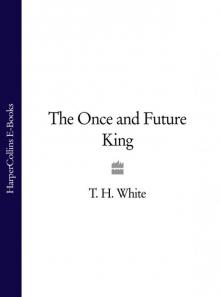 The Once and Future King (#1-4)
The Once and Future King (#1-4)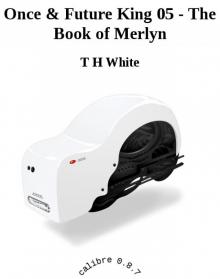 Once & Future King 05 - The Book of Merlyn
Once & Future King 05 - The Book of Merlyn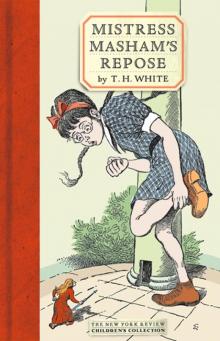 Mistress Masham's Repose
Mistress Masham's Repose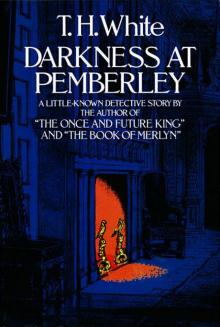 Darkness at Pemberley
Darkness at Pemberley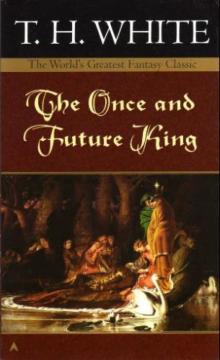 The Once and Future King
The Once and Future King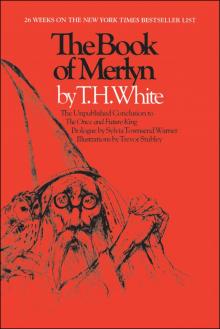 The Book of Merlyn
The Book of Merlyn Candle in the Wind
Candle in the Wind